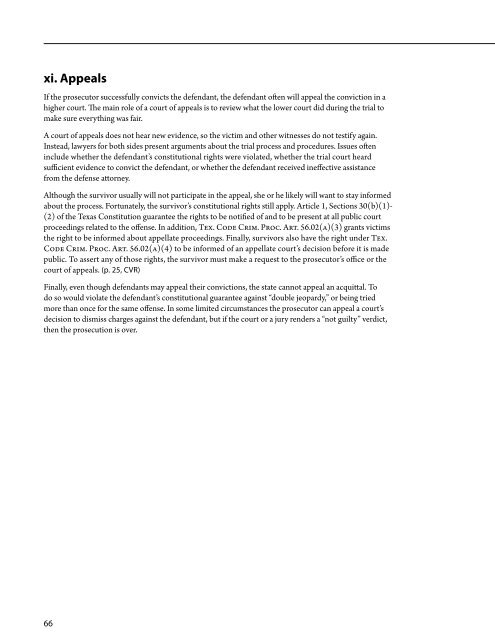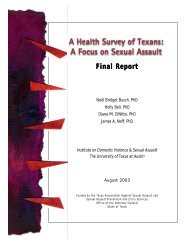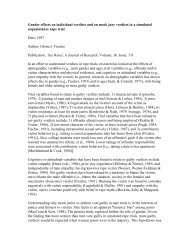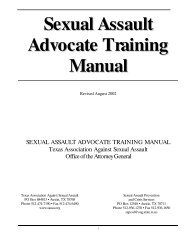Sexual aSSault LEGAL ADVOCACY MANUAL - Texas Association ...
Sexual aSSault LEGAL ADVOCACY MANUAL - Texas Association ...
Sexual aSSault LEGAL ADVOCACY MANUAL - Texas Association ...
Create successful ePaper yourself
Turn your PDF publications into a flip-book with our unique Google optimized e-Paper software.
xi. Appeals<br />
If the prosecutor successfully convicts the defendant, the defendant often will appeal the conviction in a<br />
higher court. The main role of a court of appeals is to review what the lower court did during the trial to<br />
make sure everything was fair.<br />
A court of appeals does not hear new evidence, so the victim and other witnesses do not testify again.<br />
Instead, lawyers for both sides present arguments about the trial process and procedures. Issues often<br />
include whether the defendant’s constitutional rights were violated, whether the trial court heard<br />
sufficient evidence to convict the defendant, or whether the defendant received ineffective assistance<br />
from the defense attorney.<br />
Although the survivor usually will not participate in the appeal, she or he likely will want to stay informed<br />
about the process. Fortunately, the survivor’s constitutional rights still apply. Article 1, Sections 30(b)(1)-<br />
(2) of the <strong>Texas</strong> Constitution guarantee the rights to be notified of and to be present at all public court<br />
proceedings related to the offense. In addition, Tex. Code Crim. Proc. Art. 56.02(a)(3) grants victims<br />
the right to be informed about appellate proceedings. Finally, survivors also have the right under Tex.<br />
Code Crim. Proc. Art. 56.02(a)(4) to be informed of an appellate court’s decision before it is made<br />
public. To assert any of those rights, the survivor must make a request to the prosecutor’s office or the<br />
court of appeals. (p. 25, CVR)<br />
Finally, even though defendants may appeal their convictions, the state cannot appeal an acquittal. To<br />
do so would violate the defendant’s constitutional guarantee against “double jeopardy,” or being tried<br />
more than once for the same offense. In some limited circumstances the prosecutor can appeal a court’s<br />
decision to dismiss charges against the defendant, but if the court or a jury renders a “not guilty” verdict,<br />
then the prosecution is over.<br />
66
















